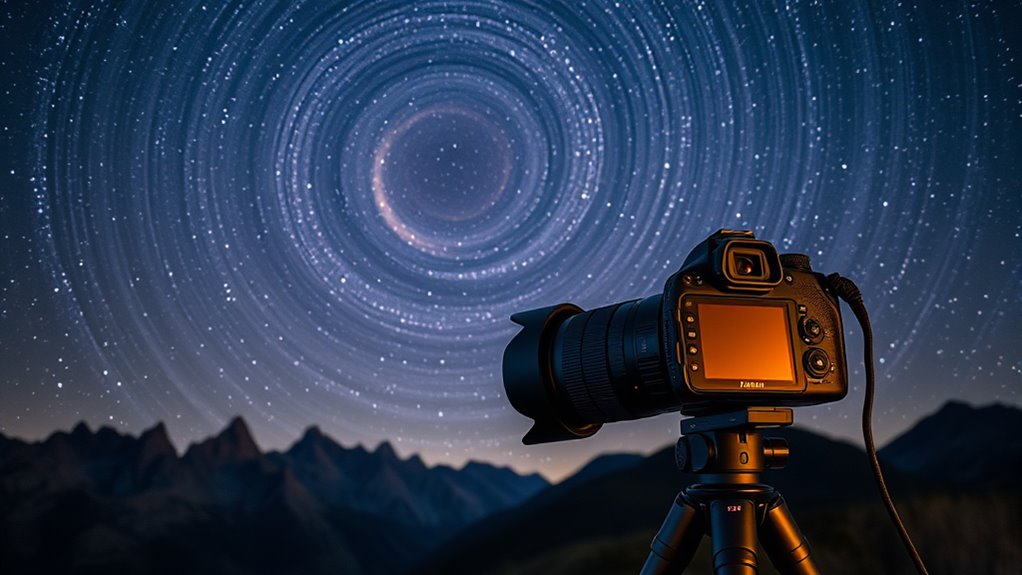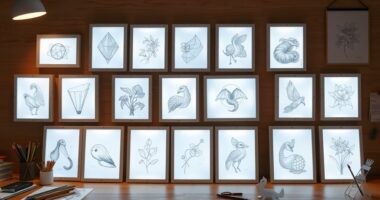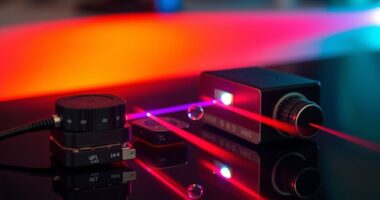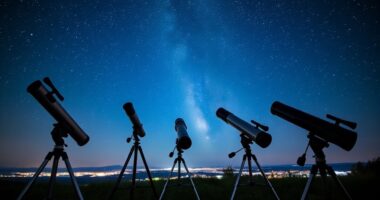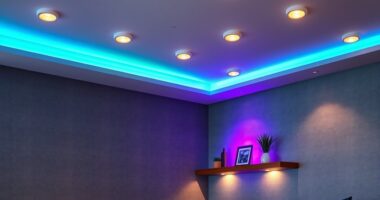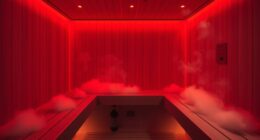If you’re after the best astro-modified DSLR cameras for stunning night sky shots, I recommend considering models like the Canon EOS 2000D, Rebel T7, and Nikon D780—these offer high-resolution sensors with excellent low-light performance. Upgrading these cameras with astro modifications can drastically improve faint object capture. Keep in mind factors like sensor sensitivity and compatibility. If you want expert insights and detailed suggestions, there are more details ahead to guide your choice.
Key Takeaways
- Look for DSLR models with high ISO capabilities and large sensors like Nikon D780 or Canon EOS 2000D for capturing faint celestial details.
- Consider cameras with compatibility for astro-specific modifications, such as sensor sensitivity to H-alpha emissions.
- Prioritize models supporting external filters, such as IR or H-alpha filters, to enhance deep-sky imaging.
- Choose cameras with robust build quality and compatibility with astrophotography accessories like telescopes and tracking mounts.
- Focus on cameras with reliable low-light performance, good battery life, and options for remote control to facilitate extended night sky sessions.
Canon EOS Rebel T7 DSLR Camera 2 Lens Kit (EF18-55mm + EF75-300mm)
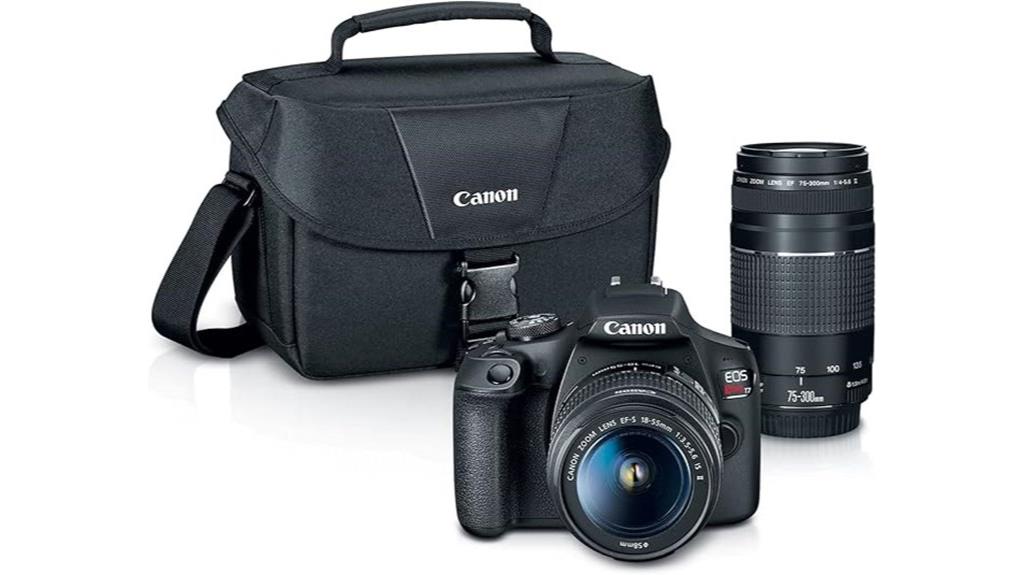
Are you a beginner or hobbyist looking to explore astrophotography without breaking the bank? The Canon EOS Rebel T7 DSLR Camera with its two versatile lenses (EF18-55mm and EF75-300mm) is an excellent choice. It boasts a 24.1MP CMOS sensor that captures crisp, vibrant images even in low light. Its built-in Wi-Fi makes sharing your night sky shots easy, and scene auto mode simplifies settings for beginners. The lightweight, durable design and reliable autofocus system help you focus on composing stunning shots. While it doesn’t shoot 4K video, its solid image quality and user-friendly features make it a smart entry-level option for capturing the stars.
Best For: beginners and hobbyists interested in exploring astrophotography and capturing vibrant images in low light conditions without investing in high-end equipment.
Pros:
- 24.1MP CMOS sensor delivers sharp, detailed, and vibrant images even in low light.
- Built-in Wi-Fi facilitates quick sharing of photos and videos directly from the camera.
- Lightweight and durable design makes it portable and suitable for extended shooting sessions.
Cons:
- Does not support 4K video recording, limiting high-resolution video options.
- Autofocus in Live View mode can be slower, which may affect capturing fast-moving astrophotography scenes.
- Lacks a touchscreen or articulating LCD, which might make navigation less intuitive for some users.
Canon EOS 2000D DSLR Camera Kit with 3 Lenses and Accessories
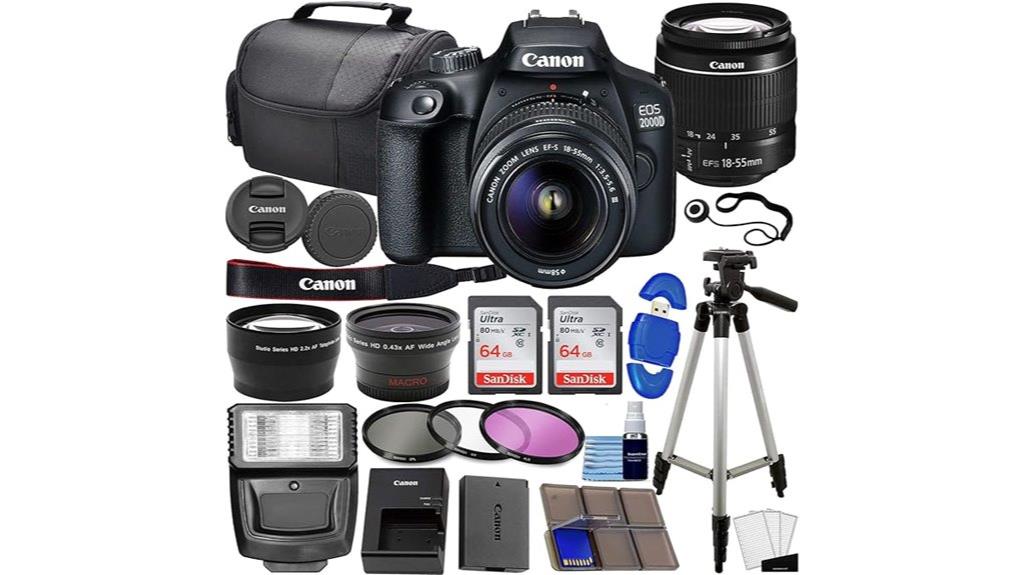
The Canon EOS 2000D DSLR Camera Kit with 3 lenses and accessories is an excellent choice for amateur astronomers looking to capture stunning night sky images, especially since its high-resolution 24.1MP sensor and user-friendly features make astrophotography more accessible. It offers a solid APS-C sensor, Full HD video, and easy Wi-Fi connectivity, perfect for beginners. The kit includes versatile lenses—a wide-angle, telephoto, and standard zoom—plus a tripod and accessories, providing everything needed to start. While the included tripod may need an upgrade for stability, the camera’s straightforward operation, combined with its image quality, makes it a compelling option for those exploring astrophotography.
Best For: amateur photographers and beginner astrophotographers seeking an easy-to-use DSLR with versatile lenses and good image quality for night sky photography.
Pros:
- High-resolution 24.1MP APS-C sensor delivers sharp, detailed images.
- User-friendly features and modes, ideal for beginners.
- Includes a comprehensive kit with multiple lenses and accessories for versatile photography.
Cons:
- The included tripod is of lower quality and may require upgrading for stability.
- Some accessories may need replacement or enhancement over time.
- As a pre-owned or refurbished item, it may have minor cosmetic imperfections despite functional quality.
Canon EOS Rebel T7 DSLR Camera with 18-55mm Lens (Black)
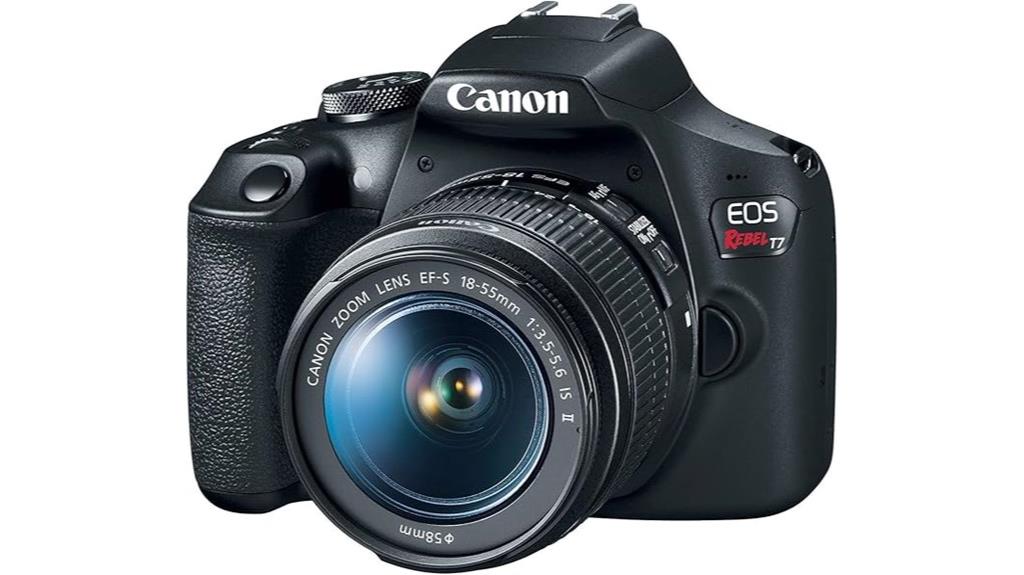
For beginners interested in exploring astrophotography, the Canon EOS Rebel T7 DSLR Camera with 18-55mm lens offers an excellent starting point thanks to its user-friendly features and high-quality sensor. Its 24.1 MP CMOS sensor captures detailed images even in low-light conditions, while the ISO range of 100–6400 (expandable to 12800) helps you shoot clear night sky photos. The camera’s large 3.0-inch LCD and optical viewfinder make composing shots simple, and built-in Wi-Fi and NFC enable quick sharing. With autofocus and multiple shooting modes, it’s easy to get sharp, stunning images, making it a versatile choice for budding astrophotographers.
Best For: beginners and amateur photographers interested in exploring astrophotography with a user-friendly DSLR that offers high-quality images and easy sharing features.
Pros:
- 24.1 MP CMOS sensor captures detailed images even in low-light conditions, ideal for night sky photography
- Built-in Wi-Fi and NFC enable quick and easy sharing of astrophotos to devices and social media
- User-friendly interface with scene modes and autofocus makes it accessible for beginners exploring astrophotography
Cons:
- Limited ISO range (up to 6400, expandable to 12800) may restrict performance in extremely low-light conditions compared to higher-end models
- Kit lens (18-55mm) may have limitations for distant astrophotography without additional telephoto lenses
- As a renewed product, it may have reduced lifespan or potential for minor wear compared to new units
Canon EOS Rebel T7 DSLR Camera Kit with 64GB Card and Shoulder Bag
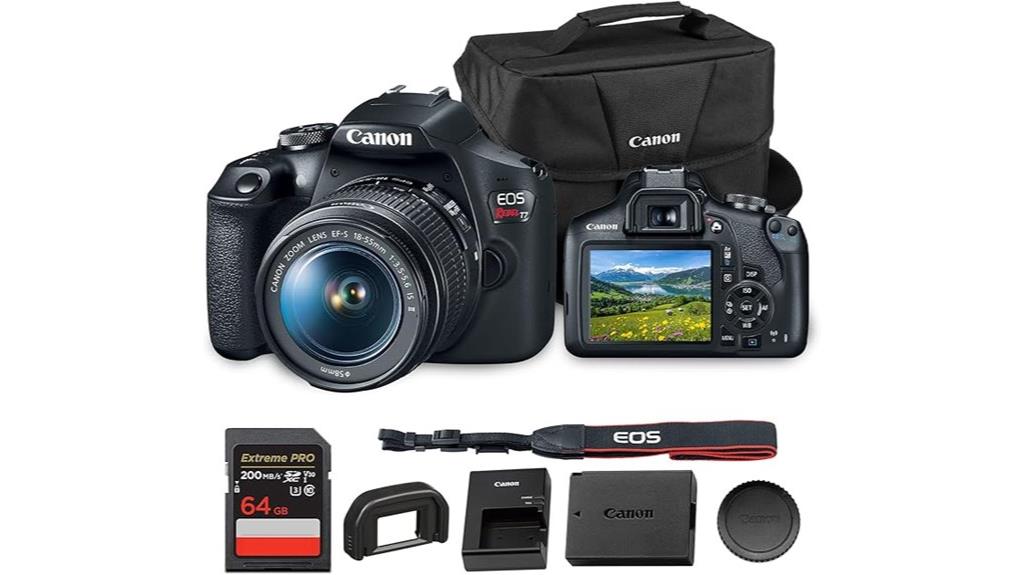
If you’re looking for an easy-to-use DSLR that delivers stunning image quality right out of the box, the Canon EOS Rebel T7 Kit is an excellent choice. Its 24.1MP APS-C CMOS sensor produces vibrant colors, sharp details, and impressive low-light performance. The DIGIC 4+ processor ensures fast operation with reduced noise and better clarity. It supports smooth video recording and features a bright optical viewfinder, plus a 3.0-inch LCD screen for easy framing. The kit includes a 64GB memory card, shoulder bag, and versatile EF and EF-S lens options. Built-in Wi-Fi and NFC make sharing simple, making this camera perfect for both beginners and hobbyists.
Best For: beginners and hobbyists seeking an easy-to-use DSLR with excellent image quality and versatile sharing options.
Pros:
- User-friendly design with automatic settings and intuitive controls
- High-resolution 24.1MP sensor delivers vibrant, sharp images and good low-light performance
- Built-in Wi-Fi and NFC enable quick, seamless sharing and remote control
Cons:
- Limited battery capacity may require frequent recharging during extended shoots
- No 4K video recording, only Full HD support
- Lenses are not included in the kit, requiring additional purchase for different photographic styles
Nikon D7500 DX-Format Digital SLR Body
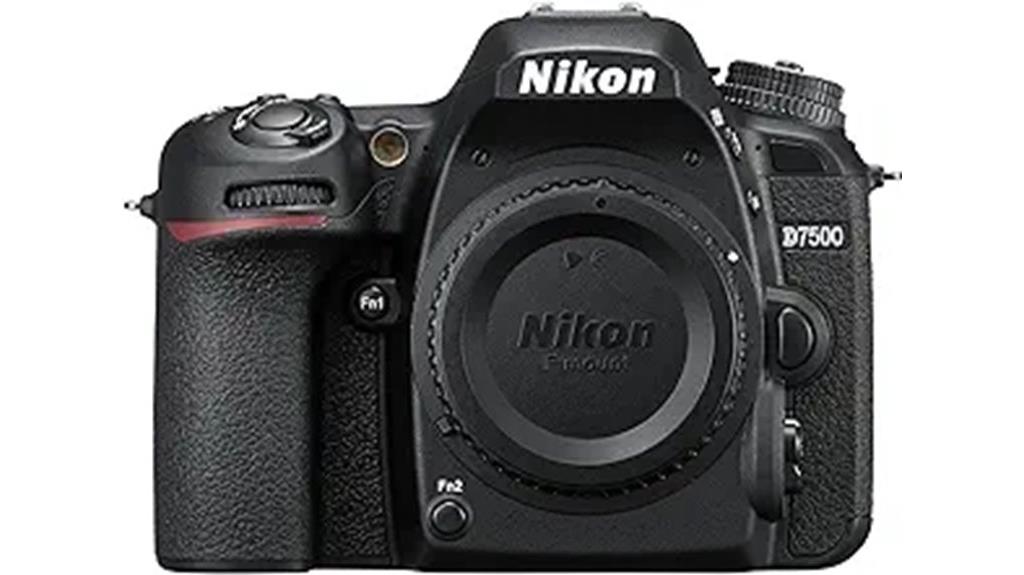
Photographers interested in astrophotography will find the Nikon D7500 DX-Format DSLR an excellent choice due to its impressive ISO range and robust image processing capabilities. Its 20.9-megapixel sensor captures sharp, detailed images even in low light, while the 51-point autofocus system ensures quick, accurate focusing. With 8 fps continuous shooting and 4K Ultra HD video, it offers versatility for capturing moving celestial objects and star trails. The weather-resistant body and tilting LCD enhance outdoor usability, and built-in Wi-Fi simplifies sharing. Overall, the D7500 provides a reliable, powerful platform for night sky photography, making it a compelling option for astro enthusiasts.
Best For: astrophotographers and night sky enthusiasts seeking a durable, feature-rich DSLR with excellent low-light performance and versatile video capabilities.
Pros:
- High ISO range and advanced image processing enable excellent low-light and astrophotography results
- Weather-resistant body and tilting LCD enhance outdoor shooting durability and flexibility
- Fast autofocus and continuous shooting at 8 fps are ideal for capturing celestial movements and star trails
Cons:
- Larger and heavier than compact cameras, which may be less convenient for extended outdoor shoots
- Slight learning curve for beginners due to extensive features and controls
- Lack of support for older AI lenses and limited lens metadata in images
Sony Alpha a6100 w/ 16-50mm + 55-210mm
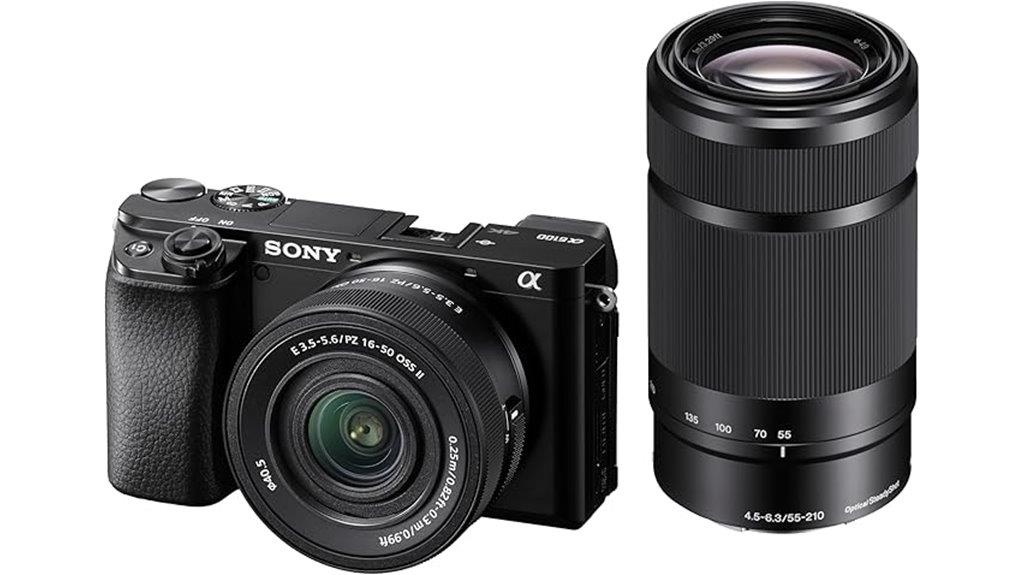
The Sony Alpha a6100 with 16-50mm and 55-210mm lenses stands out as an excellent choice for amateur astronomers and astrophotography enthusiasts who want a compact, high-quality camera capable of capturing celestial details. Its 24.2MP APS-C sensor and BIONZ X processor deliver sharp, detailed images even in low light. With ISO up to 51,200, it handles various lighting conditions, while lightning-fast autofocus guarantees crisp shots of moving stars or planets. The 4K video capabilities and tiltable touchscreen add versatility. Its lightweight design makes it ideal for travel, and the included zoom lenses provide flexibility for wide-field night sky shots and close-ups.
Best For: amateur astronomers and astrophotography enthusiasts seeking a compact, high-quality camera capable of capturing detailed celestial images and videos.
Pros:
- 24.2MP APS-C sensor with BIONZ X processor delivers sharp, detailed images in various lighting conditions.
- Fast autofocus at 0.02 seconds and high ISO up to 51,200, ideal for low-light astrophotography.
- Versatile zoom lenses (16-50mm and 55-210mm) suitable for wide-field night sky shots and close-ups.
Cons:
- Limited built-in stabilization, which may require additional equipment for super-steady shots.
- Battery life might be shorter during extensive astrophotography sessions.
- Lacks integrated GPS, so location tagging of images requires external devices or apps.
Canon EOS 2000D DSLR Camera Kit with 3 Lenses and Accessories
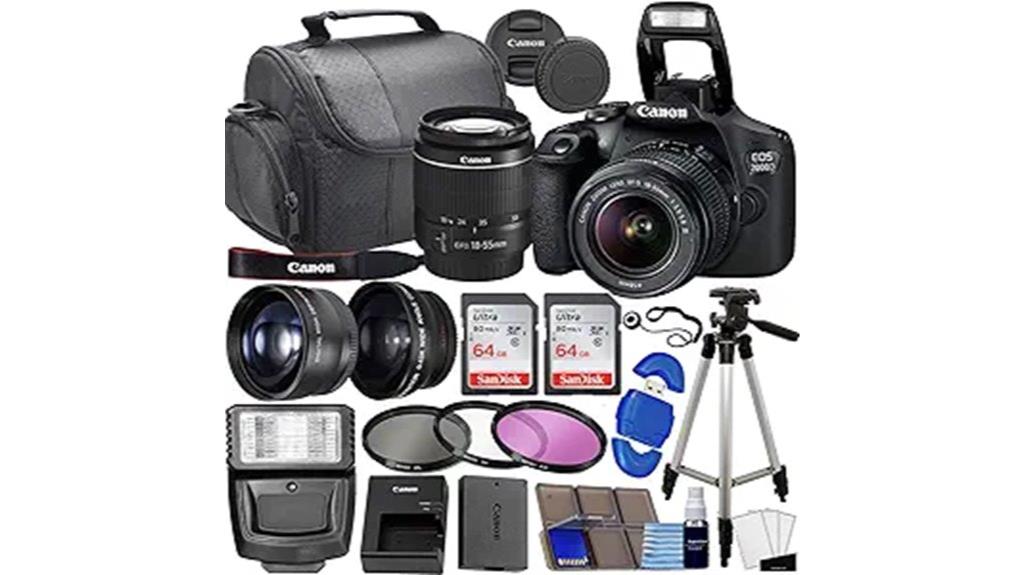
For astrophotographers seeking versatile gear tailored to their nighttime pursuits, the Canon EOS 2000D DSLR Camera Kit stands out. It includes the Rebel T7 body, an 18-55mm lens, plus extra wide-angle and telephoto lenses, giving you flexible framing options. The 24.1MP APS-C sensor and DIGIC 4+ processor produce sharp, high-resolution images, even in low light. With built-in Wi-Fi, a 3-inch LCD, and a range of auto modes, it’s user-friendly and easy to operate. The kit’s accessories, like a tripod and filters, make it ideal for night sky photography, providing everything you need to capture stunning astrophotos.
Best For: astrophotographers and nighttime photography enthusiasts seeking a versatile DSLR kit with multiple lenses and accessories for capturing stunning night sky images.
Pros:
- High-resolution 24.1MP APS-C sensor ensures detailed, sharp images even in low-light conditions
- Includes wide-angle and telephoto lenses for versatile framing options suitable for astrophotography
- Built-in Wi-Fi and intuitive auto modes make setup and sharing easy for beginners and experienced users alike
Cons:
- International model without manufacturer details may limit warranty or service options in some regions
- DIGIC 4+ processor, while capable, is less advanced compared to newer image processing engines
- No dedicated astrophotography-specific features or accessories included, requiring additional investment for specialized night sky imaging
Canon EOS Rebel T7 DSLR Camera Bundle with Accessories
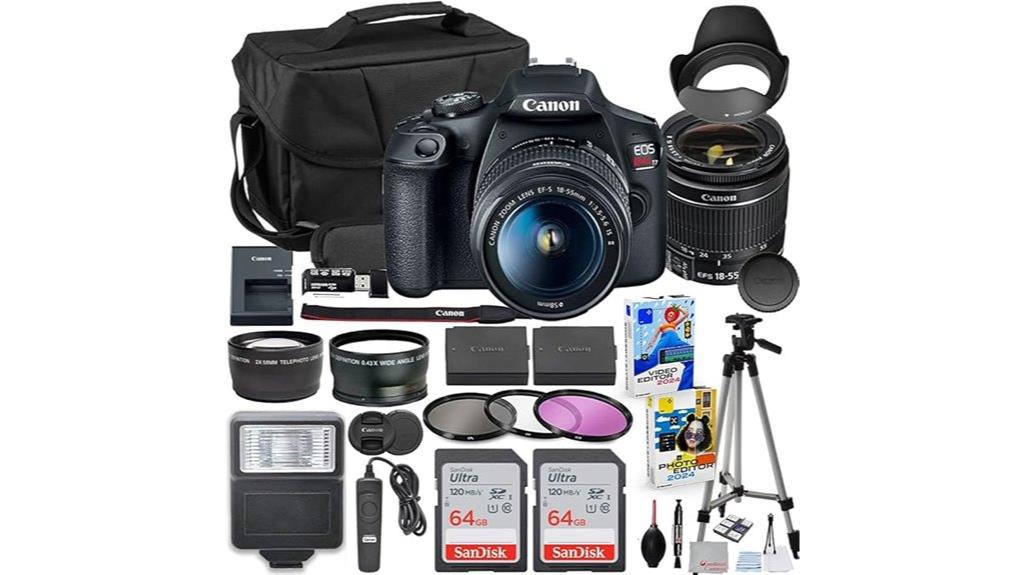
Looking to capture stunning astrophotography with a versatile DSLR? The Canon EOS Rebel T7 bundle is an excellent choice. It features a 24.1MP APS-C sensor and DIGIC 4+ processor, delivering high-quality images even in low light. The 3.0″ LCD monitor and built-in Wi-Fi make reviewing and sharing your shots easy. Included are the versatile EF-S 18-55mm lens, extra batteries, memory cards, and accessories like filters and a tripod. Its autofocus system and scene modes simplify capturing sharp night sky images. Compact and lightweight, this bundle is perfect for beginners and enthusiasts wanting a reliable, feature-rich camera ready to enhance their astrophotography adventures.
Best For: beginners and casual photographers seeking a versatile, feature-rich DSLR camera for high-quality images and astrophotography.
Pros:
- High-resolution 24.1MP APS-C sensor delivers sharp, detailed images in various lighting conditions
- Wireless Wi-Fi and NFC enable quick sharing and remote control for convenience
- Extensive accessory bundle, including extra batteries, filters, tripod, and software, enhances versatility and value
Cons:
- Limited to 1080p video recording, lacking 4K capabilities for videographers
- Autofocus system with only 9 points may be less suited for fast-moving subjects
- Built-in flash and basic features might require upgrades for advanced photography needs
Canon EOS Rebel T6 DSLR Camera Kit with EF-S 18-55mm Lens (Renewed)
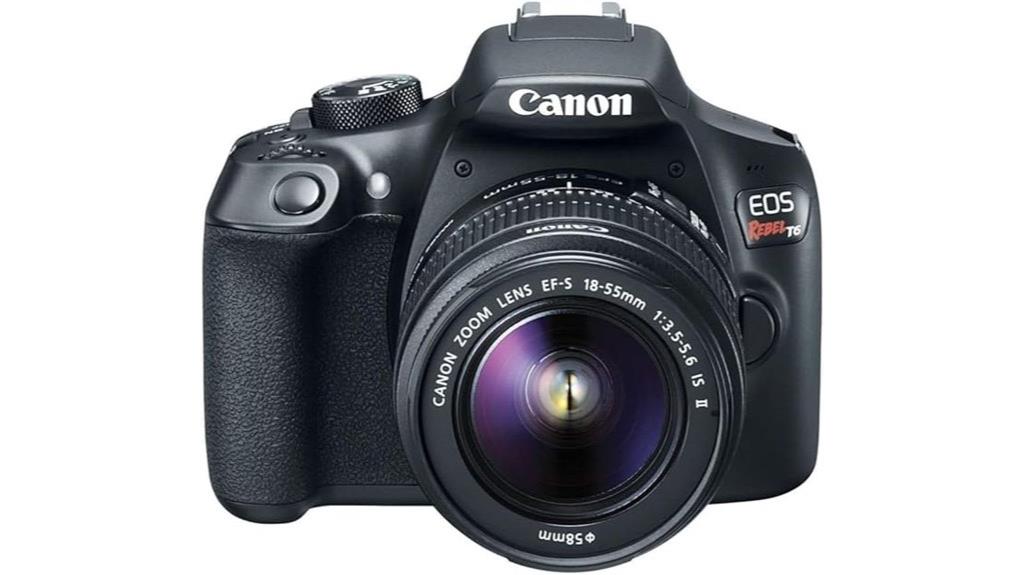
If you’re interested in exploring astrophotography with a budget-friendly option, the Canon EOS Rebel T6 DSLR Camera Kit with EF-S 18-55mm lens offers a solid foundation. Its 18.0 MP APS-C CMOS sensor captures detailed images, while the DIGIC 4+ processor guarantees quick processing and better image quality. The 3-inch LCD makes framing easy, and full HD 1080p video adds versatility. With ISO from 100-6400 (expandable to 12800), it handles various lighting conditions. Built-in Wi-Fi and NFC enable quick sharing and remote control. Compact and lightweight, this renewed kit is perfect for beginners interested in night sky photography without breaking the bank.
Best For: beginner and amateur astrophotographers seeking an affordable, versatile DSLR with Wi-Fi connectivity for night sky photography.
Pros:
- High-resolution 18.0 MP sensor captures detailed images suitable for astrophotography
- Built-in Wi-Fi and NFC for easy image sharing and remote control
- Compact and lightweight design ideal for portable night sky shooting
Cons:
- Kit lens may have limitations in low-light astrophotography without additional accessories
- Battery life might be limited during extended night shoots
- No dedicated astrophotography features or specialized modes included
Canon EOS R100 Mirrorless Camera Kit (RF-S18-45mm & RF-S55-210mm Lenses)
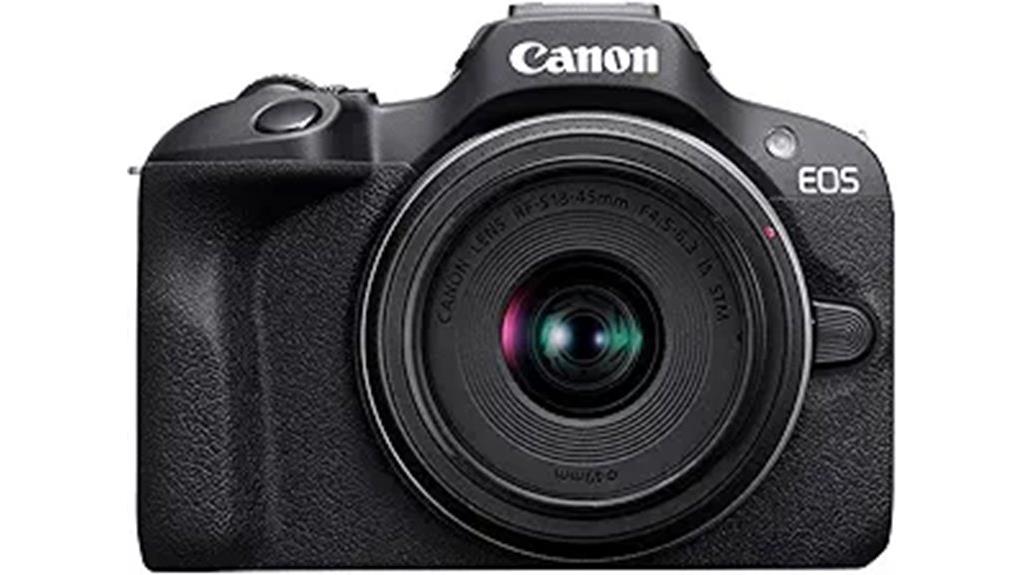
The Canon EOS R100 Mirrorless Camera Kit stands out as an excellent choice for astrophotography enthusiasts seeking a compact, lightweight camera that doesn’t compromise on image quality. It features a 24.1 MP APS-C CMOS sensor paired with the DIGIC 8 processor, delivering sharp, vibrant images even in low light. The kit includes versatile RF-S18-45mm and RF-S55-210mm lenses, ideal for capturing wide Milky Way scenes or distant celestial objects. With Dual Pixel CMOS AF covering 143 zones, Eye Detection, and continuous shooting at 6.5 fps, it’s perfect for tracking stars or fleeting astronomical moments. Plus, it supports 4K video, offering versatile recording options.
Best For: astrophotography enthusiasts seeking a compact, high-quality mirrorless camera with versatile lenses and advanced autofocus features.
Pros:
- Compact and lightweight design ideal for portability and outdoor shooting
- 24.1 MP APS-C sensor with DIGIC 8 processor ensures sharp, vibrant images in low light
- Versatile kit with RF-S18-45mm and RF-S55-210mm lenses perfect for wide and distant celestial captures
Cons:
- Limited maximum aperture (f/6.3 at the telephoto end) may reduce performance in very low light conditions
- Continuous shooting speed of 6.5 fps might be modest for capturing fast-moving objects
- 4K video recording may lack advanced video features found in higher-end models
Canon EOS Rebel T7 DSLR Camera Kit (5 Items)
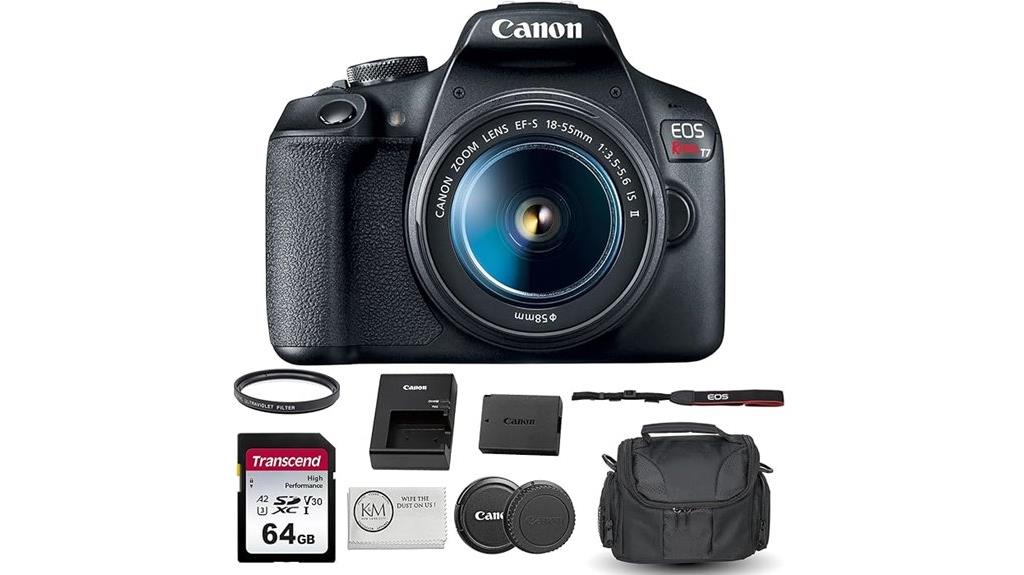
For astrophotographers who want a versatile entry point, the Canon EOS Rebel T7 DSLR Camera Kit offers an excellent combination of image quality and expandability. It features a 24.1MP APS-C CMOS sensor and DIGIC 4+ processor, delivering sharp, high-resolution images with reduced noise. The kit includes essential accessories like a 64GB SDXC card, UV filter, camera case, and microfiber cloth, making it convenient for night sky photography. With built-in Wi-Fi, full HD recording, and user-friendly modes, it’s perfect for beginners and enthusiasts alike. All items are brand new with full USA warranties, ensuring reliability as you explore astrophotography.
Best For: astrophotographers and beginners seeking a versatile, high-quality DSLR kit with expandability and user-friendly features for night sky photography.
Pros:
- High-resolution 24.1MP APS-C CMOS sensor delivers sharp, detailed images with reduced noise.
- Includes essential accessories like a 64GB SDXC card, UV filter, and camera case for convenient outdoor and astrophotography use.
- Built-in Wi-Fi and full HD video capabilities enhance connectivity and multimedia options.
Cons:
- The kit’s 9-point autofocus system may be less advanced compared to higher-end models.
- Limited ISO range (100-6400) might restrict low-light astrophotography in extremely dark conditions without additional equipment.
- The kit, while beginner-friendly, may lack some advanced features preferred by professional astrophotographers.
Canon EOS 2000D DSLR Camera Bundle (Renewed)
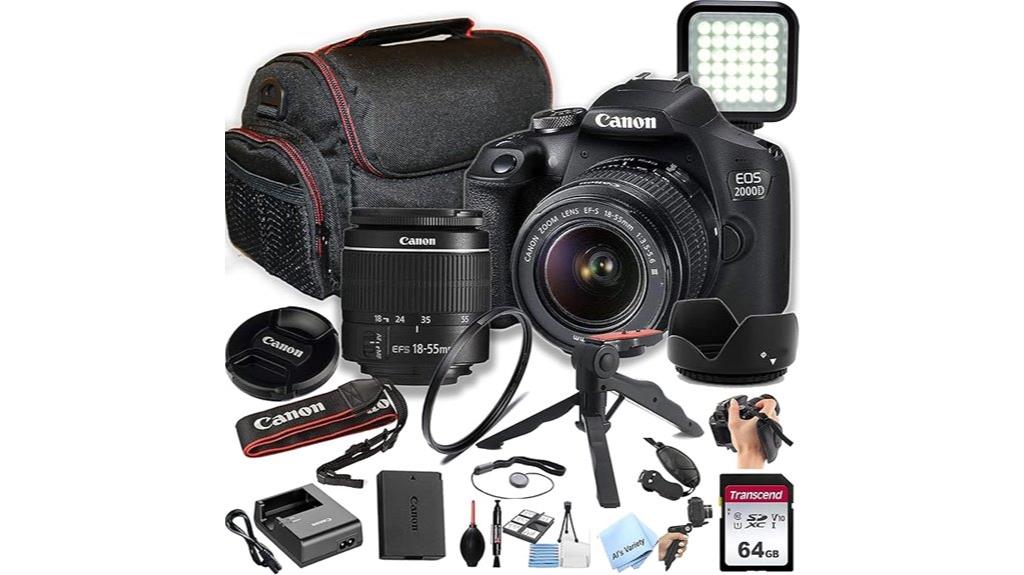
The Canon EOS 2000D DSLR Camera Bundle (Renewed) stands out as an excellent choice for beginners enthusiastic to explore astrophotography, thanks to its high-resolution 24.1MP sensor and versatile manual controls. It captures detailed night sky shots with its APS-C CMOS sensor and supports ISO sensitivity up to 6400 (expandable to 12800). The bundle includes a versatile EF-S 18-55mm lens, ideal for wide-angle shots. Connectivity features like Wi-Fi and NFC make sharing easy, while the intuitive interface and creative modes help beginners learn and experiment. With a 1-year warranty and a thorough accessory kit, it’s a reliable, user-friendly option for aspiring astrophotographers.
Best For: Beginners and aspiring astrophotographers seeking a versatile, easy-to-use DSLR with excellent low-light capabilities and creative control.
Pros:
- High-resolution 24.1MP APS-C sensor captures detailed images and night sky shots
- User-friendly interface with creative auto modes and on-screen guidance suitable for beginners
- Built-in Wi-Fi and NFC for seamless sharing and remote control
Cons:
- Limited to ISO 6400 (expandable to 12800), which may be less optimal in extremely low-light conditions compared to higher-end models
- Kit lens has a variable aperture (f/3.5-5.6), which may restrict depth of field control in certain situations
- Renewed product may have minor cosmetic wear, though it includes a 1-year warranty and accessories
Nikon D5600 24.2MP DSLR Camera with 18-55mm VR and 70-300mm Dual Lens
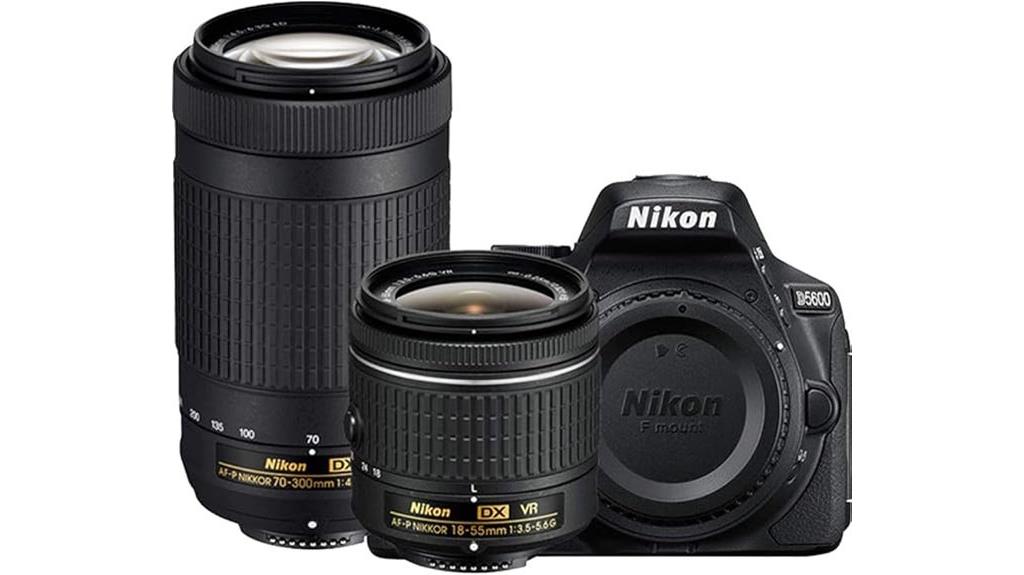
If you’re looking to capture stunning celestial images, the Nikon D5600 24.2MP DSLR with dual lenses is an excellent choice due to its high-resolution sensor and versatile zoom options. This renewed, manufacturer-refurbished camera shows minimal wear and comes with all original accessories plus a 90-day warranty. Its 24.2MP DX-format CMOS sensor delivers sharp, detailed night sky photos, while the advanced 39-point autofocus system ensures quick focusing. The kit includes an 18-55mm VR lens for wide shots and a 70-300mm zoom for distant objects. With built-in Wi-Fi via SnapBridge, you can easily transfer images and control the camera remotely.
Best For: amateur photographers and hobbyists seeking a versatile DSLR camera with high-resolution imaging and zoom capabilities for diverse shooting scenarios.
Pros:
- High 24.2MP DX-format CMOS sensor delivers sharp, detailed images suitable for various photography styles.
- Includes two versatile lenses: an 18-55mm wide-angle and a 70-300mm telephoto, ideal for landscapes, portraits, and distant subjects.
- Built-in Wi-Fi with SnapBridge allows easy image transfer and remote control via smart devices.
Cons:
- As a refurbished model, it may have minor cosmetic imperfections despite minimal wear.
- Slightly limited video features compared to higher-end models, with 1080p at 60 fps.
- The kit lenses have variable aperture ranges, which may not be ideal for low-light conditions.
Nikon D5100 DSLR Camera with 18-55mm Lens
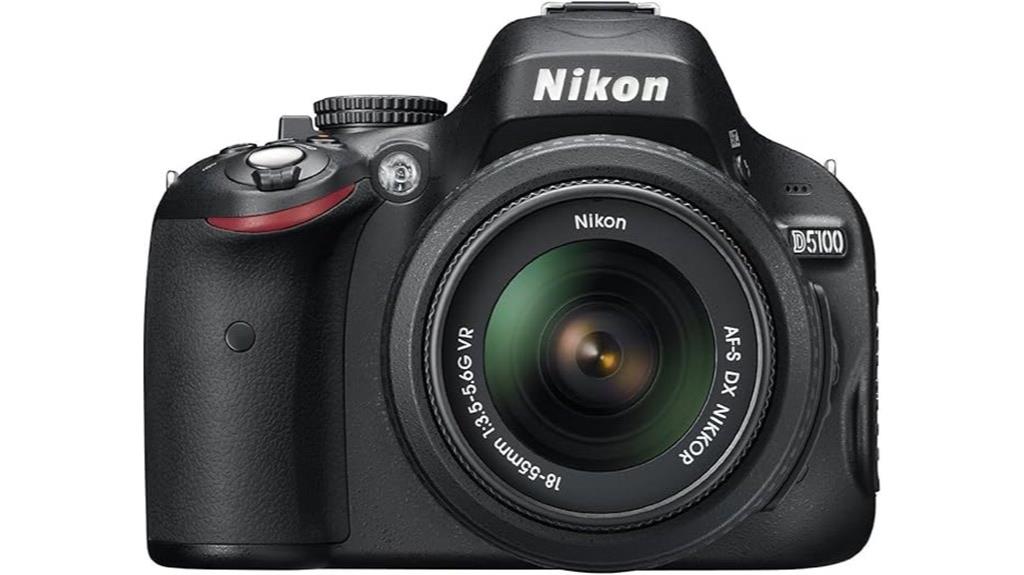
Equipped with a 16.2MP DX-format CMOS sensor and advanced image processing, the Nikon D5100 with 18-55mm lens delivers exceptional clarity and detail, making it an excellent choice for astrophotography enthusiasts. Its broad ISO range from 100 to 6400, expandable to 25600, allows low-noise shots even in challenging light conditions. The 11-point autofocus with 3D-tracking ensures accurate focus on celestial objects, while Full HD video recording captures stunning night sky scenes. The vari-angle LCD offers versatile shooting angles, and HDR mode enhances dynamic range in high-contrast scenes. Overall, this camera combines quality, flexibility, and affordability, ideal for capturing breathtaking night sky images.
Best For: amateur photographers and hobbyists seeking a versatile DSLR capable of capturing high-quality images and videos in various lighting conditions, including astrophotography.
Pros:
- High-resolution 16.2MP sensor delivers sharp, detailed images suitable for large prints and editing
- Broad ISO range (100-6400, expandable to 25600) enables excellent low-light performance and astrophotography capabilities
- Vari-angle LCD and creative modes provide flexible shooting angles and artistic options
Cons:
- Autofocus system may struggle with very faint celestial objects in low-light conditions
- Limited continuous shooting speed (approx. 4 fps) could affect capturing fast-moving astrophotography scenes
- The kit lens (18-55mm) may require upgrading for more advanced astrophotography or long-exposure needs
Nikon D780 Body
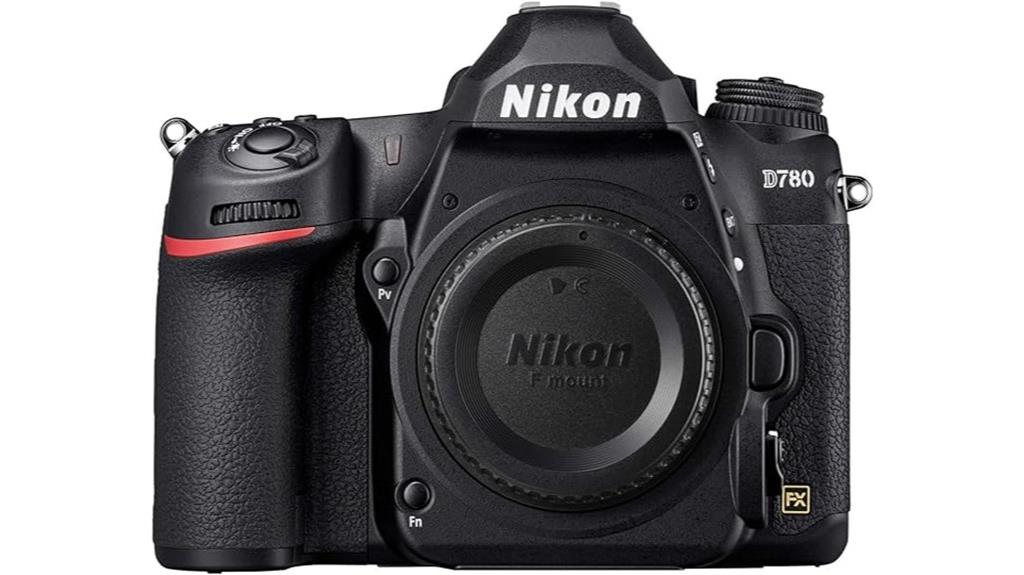
For astrophotographers seeking exceptional low-light performance, the Nikon D780 Body stands out thanks to its backside-illuminated CMOS sensor and wide ISO range. Its 24.5 MP resolution delivers sharp, detailed images, while the ISO 100-51200 range allows for flexible shooting in dark skies. The 51-point autofocus system, including eye-detection AF and wide coverage, ensures precise focus on stars and celestial objects. With fast shutter speeds up to 1/8000 sec and long exposures, it handles both rapid movements and deep-sky shots. Its robust build, intuitive touchscreen, and excellent low-light capabilities make it a versatile choice for astro-imagers.
Best For: astrophotographers and low-light imaging enthusiasts seeking high-quality DSLR performance for celestial and nighttime photography.
Pros:
- Exceptional low-light performance thanks to backside-illuminated CMOS sensor and wide ISO range (ISO 100-51200)
- Advanced autofocus system with eye-detection and wide coverage for precise focus on stars and celestial objects
- Versatile shooting options including fast shutter speeds and long exposures suitable for deep-sky imaging
Cons:
- May require additional accessories (e.g., telescopic adapters) for optimal astrophotography setup
- Some users report hardware issues or lens compatibility problems in certain conditions
- Heavier and bulkier compared to dedicated astrophotography cameras, potentially less portable
Factors to Consider When Choosing Astro‑Modified DSLR Cameras

When selecting an astro-modified DSLR, I consider factors like sensor sensitivity and optical compatibility to guarantee it captures faint celestial details effectively. I also look at image processing capabilities, lens options, and durability to match the demands of night sky photography. These points help me choose a camera that performs reliably and meets my specific astrophotography needs.
Sensor Sensitivity Range
Choosing an astro-modified DSLR camera means paying close attention to its sensor sensitivity range, which directly impacts your ability to capture faint celestial objects. These cameras typically feature enhanced ISO sensitivity, often up to ISO 12800 or higher, allowing for better detection of dim stars and nebulae. The sensor’s spectral response is modified to boost light from hydrogen-alpha (H-alpha) emission lines, pivotal for capturing nebulae in detail. A wider sensitivity range helps the camera perform well under various light pollution and atmospheric conditions. Increased sensitivity means you can use shorter exposures, reducing star trailing and motion blur. However, managing noise through calibration and noise reduction techniques is essential to maintain sharp, high-quality images in low-light astrophotography.
Optical Compatibility Options
Have you considered how your camera’s optical compatibility influences your astrophotography results? It’s vital because the lens mount must match your astro-modified DSLR to guarantee proper attachment and functionality with astro-specific accessories. Supporting high-quality, wide-aperture lenses is key for gathering maximum light, which directly impacts image brightness and detail. Additionally, check if the viewfinder or live view offers accurate framing and focusing options suitable for celestial objects. Compatibility with external filters, like narrowband or broadband types, depends on the camera’s filter threading and optical design. Finally, a robust optical system that minimizes internal reflections and aberrations is essential for capturing sharp, clear astrophotos. These factors collectively guarantee you get the best possible performance from your modified DSLR in night sky photography.
Image Processing Capabilities
Optical compatibility sets the foundation for quality astrophotography, but the camera’s image processing capabilities determine how well you can capture and refine those stunning night sky images. Astro-modified DSLRs often feature enhanced processors that handle the unique color and light spectrum used in astrophotography. These advanced processors enable higher ISO ranges with less noise, which is crucial for capturing faint celestial objects. Improved algorithms optimize star detail, reduce chromatic aberration, and boost contrast in low-light conditions. Additionally, efficient raw image processing allows for greater flexibility during post-processing, resulting in sharper, more detailed images. Some cameras also include firmware tweaks that improve handling of narrowband filters like hydrogen-alpha, further enhancing your ability to capture stunning astrophotos.
Lens Availability and Types
Selecting the right lens for your astro-modified DSLR is vital because it directly impacts your ability to capture clear, detailed images of the night sky. Compatibility matters, so look for lenses that fit your camera’s mounting system, like Canon EF or Nikon F mounts. Wide-angle lenses are popular because they let you capture vast sections of the sky, perfect for Milky Way shots or star trails. For more detailed work, telephoto lenses with fast apertures (f/2.8 or lower) are essential—they gather more light for deep-sky objects or planetary imaging. Additionally, specialized astrophotography lenses with minimal chromatic aberration and optimized low-light performance can considerably improve image quality. The range and availability of these lenses give you more creative options and flexibility for different astrophotography techniques.
Durability for Night Use
When choosing an astro-modified DSLR for night use, durability becomes a top priority because outdoor conditions can be unpredictable and tough on equipment. Rugged, weather-sealed bodies are essential to withstand dust, moisture, and temperature fluctuations that can affect performance. The body material, like magnesium alloy or high-grade plastic, influences how well the camera resists physical shocks and extreme weather. Proper sealing against dust and light leaks helps maintain image quality and protects internal components during long, outdoor shoots. Reinforced lens mounts and sturdy tripod compatibility are also important, ensuring stability and preventing damage from accidental bumps or drops. Investing in a well-built, durable DSLR minimizes the risk of damage and guarantees reliable performance in challenging nighttime conditions.
Connectivity and Data Transfer
Connectivity and data transfer are essential considerations because astrophotography often involves large file sizes and remote shooting locations. I look for cameras with built-in Wi-Fi, NFC, or Bluetooth to quickly transfer images without needing cables, especially when I’m far from my computer. Fast, reliable data transfer protocols are fundamental for uploading high-resolution photos and videos efficiently. Compatibility with smartphone apps and remote control software allows me to monitor and control my camera wirelessly, making sessions more convenient. Some models support direct USB or HDMI connections for high-speed data transfer and real-time viewing, which is indispensable for capturing fleeting celestial events. Ensuring the camera has the latest firmware and supports standards like 802.11ac or Bluetooth 5.0 improves transfer speeds and stability in low-signal environments.
Image Quality in Low Light
Astrophotography demands exceptional image quality in low-light conditions, making sensor performance a top priority. Astro-modified DSLRs typically feature enhanced sensor sensitivity, enabling better detection of faint celestial objects. Removing or altering the IR cut filter improves the camera’s ability to capture specific wavelengths important for astrophotography, resulting in increased detail in dark skies. These cameras also excel at higher ISO settings, producing minimal noise even in extreme low-light situations. The larger dynamic range allows for capturing subtle variations in brightness within nebulae and galaxies, revealing intricate details. Overall, the sensor performance of astro-modified DSLRs delivers superior contrast, reduced noise, and richer detail in dark conditions, making them ideal for capturing stunning night sky images.
Cost and Upgrade Potential
Choosing the right astro-modified DSLR involves weighing costs and upgrade options carefully, since these factors can substantially impact your long-term investment. Upgrading to a more advanced model often means additional expenses for new filters, lenses, or accessories to optimize imaging. However, the initial investment can be offset by firmware or hardware updates that extend the camera’s lifespan and improve performance without extra costs. Some cameras are more upgrade-friendly, allowing firmware updates that enhance capabilities or compatibility, saving you money over time. The cost of astro-modification varies depending on the provider and extent of modification, influencing the total investment needed. Opting for a DSLR with a clear upgrade path can make your gear more adaptable, reducing the need for frequent replacements as your astrophotography skills and technology evolve.
Frequently Asked Questions
How Do Astro Modifications Improve Night Sky Photography Quality?
Astro modifications improve night sky photography by removing or reducing the infrared (IR) cut filter inside the camera, allowing more nebulae and deep-sky objects to show through. This enhances the camera’s sensitivity to specific wavelengths of light that are normally blocked, resulting in richer colors and more detail. I’ve found that these modifications help me capture stunning, vibrant images of stars, nebulae, and galaxies that would otherwise be difficult to achieve.
Are There Specific Sensor Types Best Suited for Astrophotography?
Sensor types truly make a difference. I find that full-frame sensors excel for astrophotography because they capture more light and detail, essential for stunning night skies. Meanwhile, CMOS sensors are preferred for their speed and efficiency, helping to reduce noise during long exposures. I recommend a camera with a high-quality, large sensor, as it balances sensitivity and noise reduction, giving you those crisp, vibrant astrophotos you’re aiming for.
What Are the Maintenance Requirements for Astro-Modified DSLRS?
I keep my astro-modified DSLR in good shape by regularly cleaning the sensor and lens with a blower and gentle wipes. I avoid touching the sensor directly and store the camera in a dust-free, dry environment. Periodic firmware updates help guarantee peak performance. Also, I check for any firmware or hardware issues after long exposures to prevent image quality problems. Proper maintenance keeps my camera ready for stunning night sky shots.
Can These Cameras Be Used for Daytime Photography Without Issues?
Yes, you can definitely use astro-modified DSLR cameras for daytime photography without issues. I’ve found they work just like regular cameras during the day, capturing sharp, vibrant images. Just remember, the IR filter removal can sometimes affect color balance slightly, so a quick adjustment in post-processing helps. Overall, I enjoy the versatility of these cameras—they excel at night and perform well in daylight too.
What Budget Considerations Should I Keep in Mind for Astro-Modified Cameras?
If you think budget’s just a small detail, think again—astro-modified cameras can be a serious investment! I’ve found that prices range from entry-level options around $500 to high-end models exceeding $2,000. Keep in mind, you’re not just paying for the camera; you’re investing in specialized modifications and accessories. So, plan wisely, and remember, quality gear makes a world of difference for breathtaking night sky shots!
Conclusion
If you’re serious about capturing breathtaking night skies, these astro-modified DSLRs are absolute game-changers. They’ll open cosmic secrets that ordinary cameras can only dream of revealing. Trust me, once you upgrade, you’ll feel like you’ve unlocked a portal to another universe—your night sky photos will blow everyone’s mind! Don’t settle for average; these cameras will turn your stargazing into an epic, universe-shaking adventure you’ll never forget.
